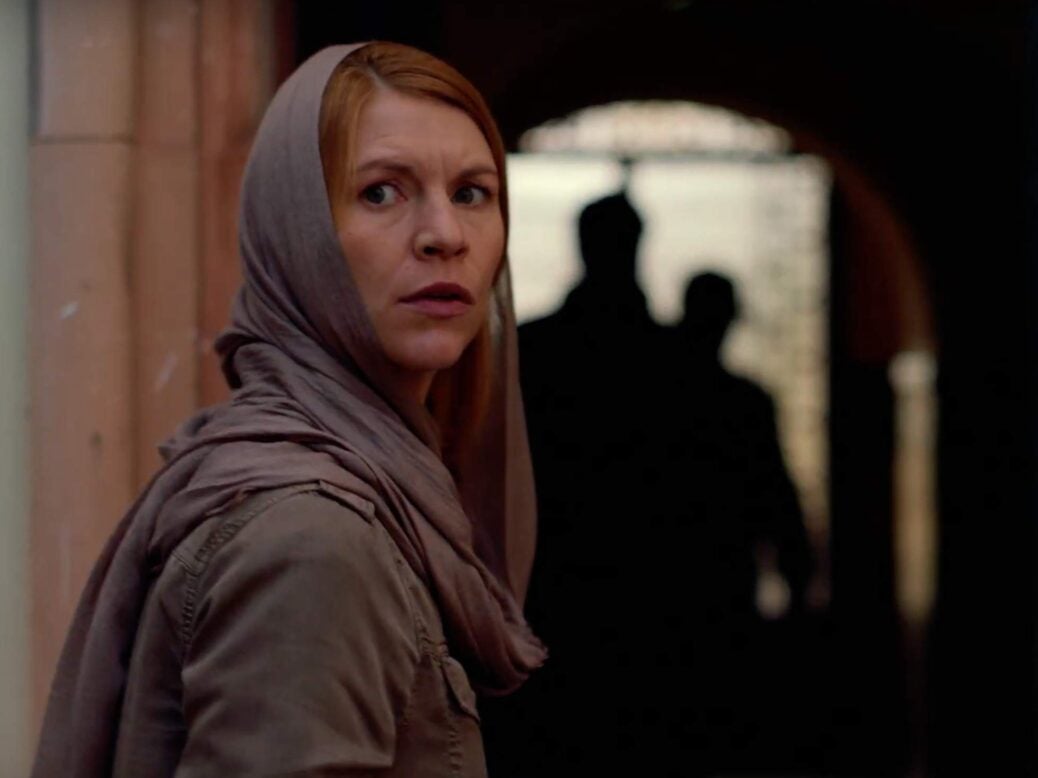
Its popularity might have dwindled as the show went on, but Homeland was a show that tracked the temper of our times: paranoid, cynical and surveillance obsessed
I may, I thought to myself the other day, be the last Briton who was still actually watching Homeland when it came to an end. I mean, technically my wife was also watching it but most of the time, when I looked over at her, she was goggling at Julia Roberts on Instagram on her phone and looking up only to make lecherous noises at the sexy GRU agent, so I don’t count her. And if I wasn’t the last, I know I was at least one of a minority.
When the first season screened back in 2012, it seemed as if the whole nation tuned in. Every week we watched, as one, Damian Lewis’s tortured ex-marine Nicholas Brodie – had he become a terrorist or not? – vacillating over whether to blow himself up with a suicide belt, and Claire Danes’s tortured CIA agent Carrie Matheson vacillating over whether to bang him up or just bang him.
The popularity of the show dwindled as time went on. But that first series – which tried to make Brodie’s position morally decipherable – set the tone, and we true believers followed that tone through seven more seasons. I’m glad we did. Mandy Patinkin’s gruff spymaster joins a pantheon that includes Harry Pearce, George Smiley, Bernie Samson and Jackson Lamb. As the show went on it tracked the temper of our times: paranoid, cynical and surveillance obsessed.
I remember thinking, when the romantic novelist turned MP turned investigative Twitterer Louise Mensch was at the height of her volubility about Russian interference in Trump’s election, that she had become Carrie Matheson in all but name. Carrie, fired up by mania, driving herself near to collapse – but on the right track, seeing connections others couldn’t see and plastering them across the wall in a web of scribbled arrows. The excitable Infowars conspiracy theorist Alex Jones even appeared in thinly disguised form in season seven as the odious Brett O’Keefe.
But with the exception of a few such cardboard cut-out blowhards, the goodies weren’t very good and the baddies weren’t bad in any ways that the goodies weren’t too. One of the special virtues of Homeland was that it flipped the characters’ allegiances on their heads five or six times a season. The title – the very idea of patriotism – became more and more sourly ironic.
Lives were always in the balance, but whose lives, and on what side of the balance, and how to weigh them, became less clear. Its basic premise was that personal relationships and individual lives were to be sacrificed on the altar of a higher good. And yet Carrie – because no drama series could work otherwise – was all about personal relationships.
Her relationship with Brodie was complicated by sex, as in the final season was her relationship with the saturnine GRU agent Yevgeny Gromov. And – the great platonic love story that turned out to be the grand theme of the show – her relationship with her CIA boss Saul Berenson was what made Carrie’s agency in service of that higher good possible. One moment, personal trust was the only thing you could depend on when great power politics seemed to be amorally tracking opportunity and influence.
At the next, personal trust was ruthlessly exploited in the service of great power politics. And everyone ends up forgiving these betrayals: it’s part of the game. Yevgeny and Saul use the same cold phrase: ‘The cost of doing business.’ No spoilers – but there is literally no end to the spying and betrayal.
Everything that ties Carrie to the normal social world falls away – her being an actual mother to an actual daughter was an inconvenience written out of the plot – yet personal relationships sustained by espionage endure. In the final season, a young female CIA agent who we’re encouraged to see as a prototype Carrie is used, lied to, used again, then lied to again by our heroine.
She comes to realise that Carrie is doing what she’s doing for all the right reasons. But she delivers a farewell speech in which she says, effectively, to hell with this: I didn’t get into this to play a game where every move smears more blood on my hands. Homeland says, over eight seasons and quite uncompromisingly: well, someone has to.
Read more
Why the Star Wars universe is more morally complex than you might think
Why are we so averse to verse?
Sam Leith on why nothing ever beats a book retreat






